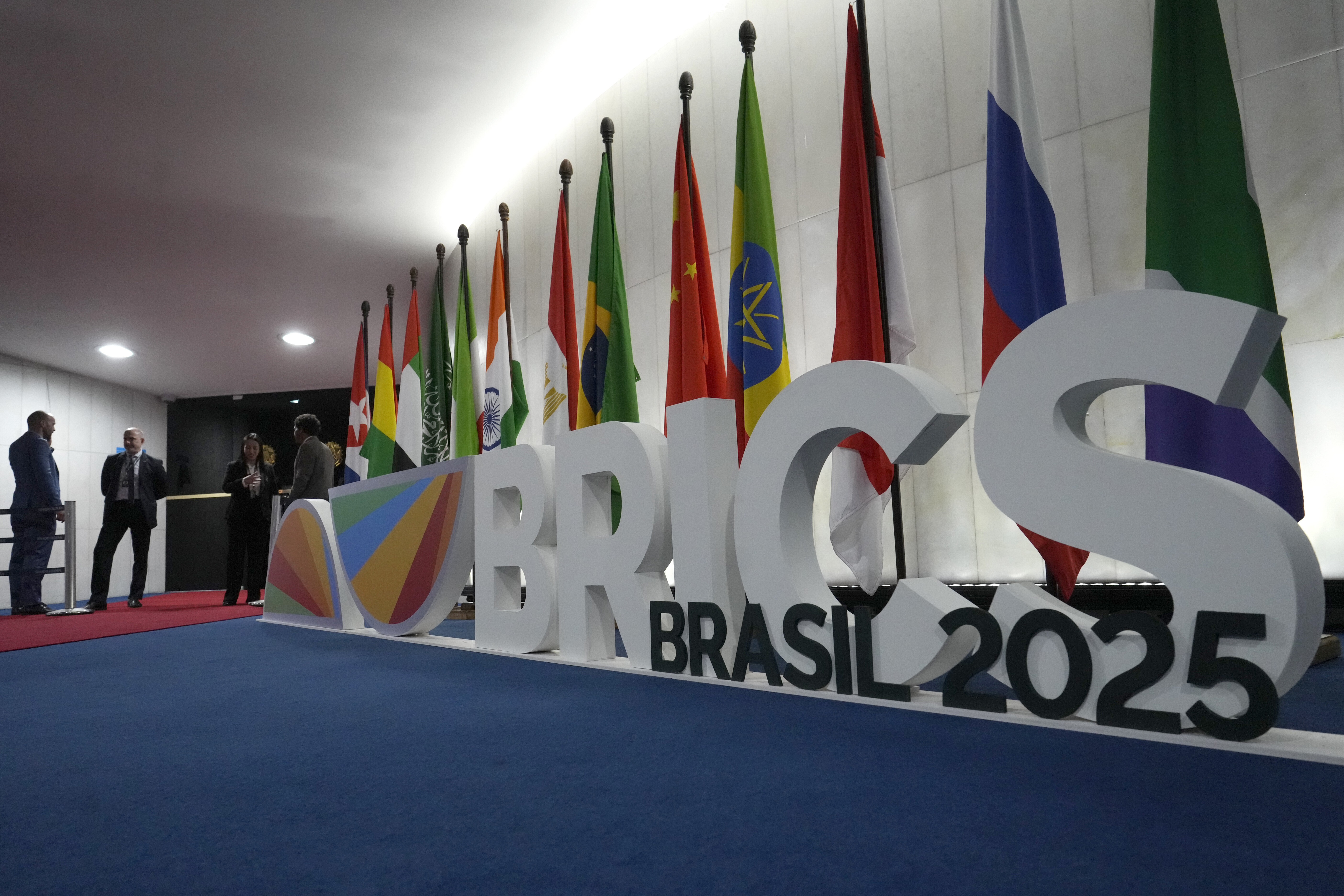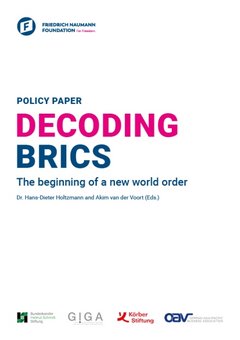BRICS Summit
BRICS - Challenges on the way to the summit in Rio de Janeiro

This summit will not be a walk in the park for Brazilian President Lula da Silva either. As at the G20 summit last November in Rio de Janeiro, Lula will also be required to be a master negotiator at the BRICS summit on Sunday and Monday in the city on Sugar Loaf Mountain.
While the biggest challenge for the former trade union leader at the G20 summit was to get his arch-rival, the anarcho-capitalist Argentinian President Javier Milei, to agree to the final communiqué, this time Lula will have to prove on several fronts that the summit in Rio de Janeiro can provide a tailwind for the further development of BRICS. Glamourous images like the ‘Putin show’ at the last summit in October in Kazan, Russia, will not be enough this time.
Summit without Putin and Xi Jinping
Two presidents of BRICS founding states will be missing in Rio de Janeiro: Putin, sanctioned with an international arrest warrant, will only attend via video conference so as not to cause diplomatic difficulties for Brazil and will be represented on site by Foreign Minister Lavrov. More surprising is the cancellation by Chinese President Xi Jinping, who is being represented by Prime Minister Li Qiang for ‘scheduling reasons’. It is rumoured that Brazil's previous refusal to join the ‘Belt and Road Initiative’ of its most important trading partner has caused disgruntlement in Beijing. China is also apparently irritated that Lula is organising a gala dinner on the sidelines of the summit for Indian President Modi, China's rival who will take over the BRICS presidency next year. The strongly divergent interests of the two Asian giants China and India have always placed rather narrow limits on the effectiveness of BRICS.
Its dealings with both partners are evidence of the foreign policy pragmatism that characterises Brazil. Due to the growing number of members and accession candidates, Brazil sees BRICS as a useful platform for representing the interests of the ‘Global South’, but by no means as an organisation directed against the West, which Brazil considers itself to be part of. Brazil is also interested in intensifying its bilateral trade and investment relations with India and does not want to rely solely on the Chinese card.
In search of consensus topics
In addition to the absence of some key BRICS heads of state, another challenge for Lula will be to achieve concrete progress on the summit agenda. This is most likely to be possible on issues where there is sufficient consensus in favour of closer cooperation between the BRICS countries. The motto of the Brazilian BRICS presidency is ‘Strengthening Global South Cooperation for More Inclusive and Sustainable Governance’ and thus fits in seamlessly with the priorities of the Brazilian G20 presidency in 2024. Specifically, Brazil is focusing on six key topics, which have already dominated an extensive calendar since the beginning of the presidency, both at political level and with expert events:
- Global health cooperation
- Trade, investment and finance
- Climate change
- Artificial intelligence governance
- Multilateral peace and security architecture
- Institutional development
Lula is unlikely to be interested in being drawn into current international conflicts at the summit and will instead endeavour to find ‘diplomatic formulations’ in the final declaration that are both face-saving and non-binding for all parties involved. This applies both to Russia's war in Ukraine and to the conflict between Israel and BRICS member Iran, which has been brought to an end - at least for the time being - by the energetic intervention of US President Trump. The heterogeneity of the BRICS group is particularly evident in Rio de Janeiro: on the one hand, the lively and open Brazilians in the city of Copacabana and Ipanema, and on the other, the reactionary and oppressive mullah regime.
Lula will have to demonstrate all his diplomatic skills to achieve a joint final declaration. At their meeting in April, the foreign ministers failed to do so at their level for the first time in the history of BRICS. This was triggered by the refusal of the two new African BRICS members, Egypt and Ethiopia, to support in the declaration South Africa as a candidate for a seat on the UN Security Council. This example also shows that although there is a general consensus in the BRICS group on the goal of stronger representation of the ‘Global South’ in multilateral organisations, national interests make agreement difficult, if not impossible, when it comes to the question of which country should actually take on this role, which weakens the effectiveness of BRICS in the reform of global governance that it is striving for.
Brazil must deliver on climate protection
The next highlight of Brazil's summit diplomacy this year is already coming up in November: the COP30 climate conference in Belém in the heart of the Amazon. Lula will therefore, in line with the summit agenda, endeavour to achieve in Rio de Janeiro at least the first concrete measures for climate protection and tackling climate change. The BRICS-owned New Development Bank, headed by former Brazilian President (and former Chief of Staff to Lula) Rousseff, is also likely to play an important role here. This bank has explicitly committed itself to financing climate and environmental protection projects. However, it has so far been limited in its capacity due to its comparatively low capitalisation and thus possible financing volume, even if it gains interested parties beyond the circle of BRICS members (e.g. Uruguay, Colombia).
The challenge for Brazil is, on the one hand, that profits from the production of oil and gas are key sources of income for some BRICS countries and economic development is therefore more important to them than international climate protection commitments (e.g. Russia, Iran).
Brazil is also struggling itself with credibility problems when it comes to climate protection, on the one hand due to illegal deforestation of rainforests (although this has decreased under Lula) and on the other hand due to oil and gas extraction projects in its own country.
Ratification of the EU-Mercosur Agreement key
While Lula is likely to face several challenges at the summit in Rio de Janeiro, the basic direction of Brazil's foreign policy is not up for debate. Brazil will endeavour to advance concrete measures for further cooperation in the BRICS group on consensus topics, while avoiding conflict-prone topics or moderating them diplomatically, particularly in order to avoid provoking new tensions with the USA under Trump.
Germany and Europe have the opportunity to utilise Brazil's pragmatic foreign policy approach to intensify political and economic cooperation. The EU-Mercosur Agreement which is now finally due for ratification after 30 years of negotiations, offers the best framework for this. The ceremonial conclusion is then planned for December - at the next summit event in Brazil, which will now also assume the presidency of Mercosur in the second half of the year.
On 25 June 2025, the Friedrich Naumann Foundation for Freedom, in cooperation with the Fundação Dom Cabral in São Paulo, organised a symposium on ‘BRICS - What to Expect from Brazil's Presidency and the Summit in Rio de Janeiro?’ with experts from the Brazilian government, academia and the private sector.

Friedrich Naumann Foundation event in São Paulo on the topic “BRICS - What to Expect from Brazil's Presidency and the Summit in Rio de Janeiro?”
© FNF Argentina.
